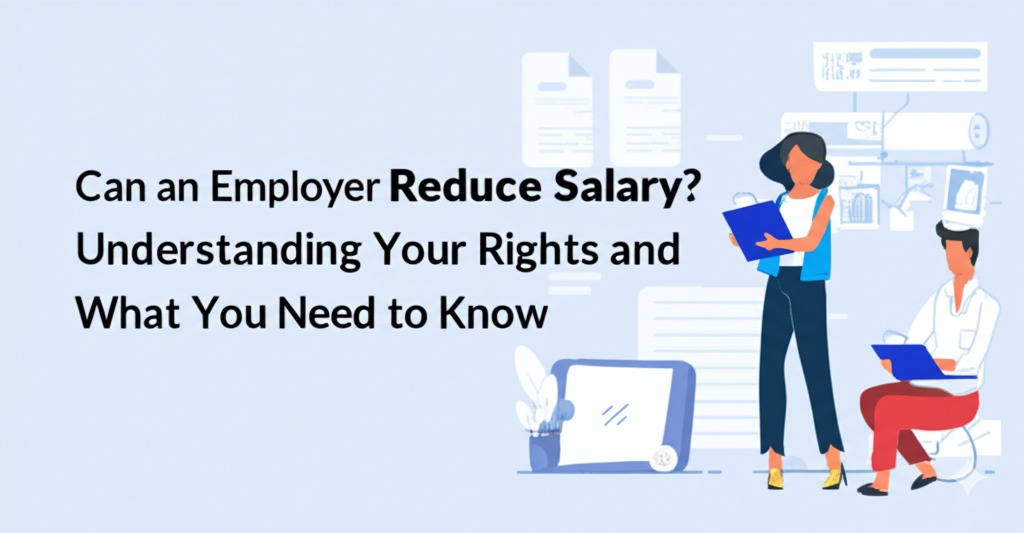
When it comes to salary and compensation, most employees expect their pay to remain consistent, if not increase, throughout their careers. However, the question arises: Can an employer reduce salary? In some situations, employers may attempt to lower salaries, but this action is not as simple as it seems. Whether you’re an employee concerned about potential salary cuts or an employer looking for guidance on salary adjustments, this article will explore the key aspects of salary reductions, your rights, and the legal implications involved.
Can Employers Legally Reduce Salaries?
When an employer reduces the salary of an employee, it may feel like an unfair or even unlawful action. However, the legality of salary reduction depends on several factors, such as the employment contract, local labor laws, and the reason for the reduction.
Employment Contracts and Salary Reduction
A significant factor that influences whether a salary reduction is legal is the terms outlined in the employee’s contract. Many employment agreements specify a fixed salary or compensation that the employer is obligated to pay. If the employer decides to reduce this salary without the employee’s consent, it may be considered a breach of contract.
However, if the employment contract allows the employer to change the terms of compensation or includes language that gives the employer flexibility in setting salary rates, the employer may be within their rights to reduce salary. Employees should always review their contracts carefully and seek legal advice if they believe their rights are being violated.
Legal Requirements and Protection for Employees
Labor laws in many countries provide protection for employees against unfair pay cuts. For example, in the United States, federal and state employment laws typically require that employees be paid the agreed-upon wage for the work they do unless there is mutual agreement or specific provisions that allow for a salary reduction.
In many jurisdictions, salary reductions must also be reasonable and justified by a legitimate business need, such as financial difficulties or restructuring. Employees can often challenge a salary reduction in court if it violates these laws.
Common Reasons Employers May Reduce Salaries
While it may be uncomfortable, salary reductions are sometimes necessary for employers. Below are some of the most common reasons for salary reductions:
1. Financial Constraints and Economic Downturns
In times of financial strain, such as during a recession or economic downturn, employers may face challenges in maintaining the same level of compensation. A salary reduction may be seen as a way to cut costs without resorting to layoffs or terminations.
2. Company Restructuring or Downsizing
If a company is undergoing restructuring, merging with another company, or reducing its workforce, salary cuts may be part of the process to realign the business structure. This could involve reducing compensation across the board or targeting specific departments or positions.
3. Changes in Job Role or Responsibilities
If an employee’s role or responsibilities significantly change, employers may adjust salaries accordingly. For example, if an employee is demoted or their job becomes less demanding, a salary reduction may be considered a fair adjustment.
4. Poor Performance or Misconduct
In some cases, an employer might reduce an employee’s salary due to poor performance or misconduct. This could be a way to enforce discipline or motivate the employee to improve their work performance.
How to Handle a Salary Reduction: What Should Employees Do?
If you’re an employee facing a salary reduction, it can be a stressful situation. However, there are steps you can take to understand your rights and respond appropriately.
1. Review Your Employment Contract
First and foremost, review your employment contract to check if there are any clauses regarding salary changes. If the contract explicitly prohibits salary reductions, you have a stronger case to contest the reduction.
2. Seek Clarification from Your Employer
If you receive notice of a salary reduction, ask your employer for clarification on the reasons behind the decision. Understanding whether the reduction is temporary or permanent can help you make informed decisions regarding your financial situation and career.
3. Consult a Legal Professional
If you believe the salary reduction is unjust or violates your employment rights, it’s important to consult with a legal professional. Labor law experts can provide insight into whether the reduction is legally enforceable and guide you through any potential legal action.
4. Consider Negotiating
In some cases, it may be possible to negotiate a salary reduction or find other alternatives, such as additional benefits or flexible working conditions. If the reduction is due to financial difficulties, an agreement to reduce hours instead of salary might be a possible compromise.
Can an Employee Refuse a Salary Reduction?
In some situations, employees can refuse a salary reduction if it constitutes a significant breach of contract or a violation of their rights. Refusing a salary reduction can lead to various outcomes, such as termination or resignation. However, depending on the circumstances, refusing the reduction could open up an avenue for negotiating other terms of employment, such as severance pay or alternative compensation options.
Potential Risks of Salary Reductions for Employers
While salary reductions may seem like an effective way for employers to cut costs, there are potential risks involved. Here are a few things employers should consider before implementing salary cuts:
1. Employee Morale and Productivity
A salary reduction can significantly impact employee morale. Employees who feel undervalued or unfairly compensated may experience decreased job satisfaction, leading to lower productivity, poor performance, or even attrition.
2. Increased Turnover
If the salary reduction leads to dissatisfaction, employees may choose to leave the company for better opportunities. High turnover rates can be costly, not only in terms of recruitment and training but also in lost expertise and team cohesion.
3. Legal Risks
If the salary reduction is deemed unlawful or not properly communicated to employees, employers may face legal consequences, including claims of breach of contract or violation of labor laws.
Conclusion: What Does a Salary Reduction Mean for You?
Ultimately, whether an employer can reduce salary depends on various factors, including the terms of the employment contract, the reason for the reduction, and local labor laws. Both employers and employees need to be aware of their rights and responsibilities in these situations.
If you’re facing a salary reduction, it’s important to review your contract, seek clarification, and consult with a legal expert if necessary. Employers, on the other hand, should weigh the long-term effects on employee morale and productivity before making such decisions. Open communication and understanding can go a long way in resolving these matters without creating undue hardship for either party.

Andre Cuevas provides career insights, job search strategies, and professional advice to help individuals navigate the job market and achieve their career goals.





